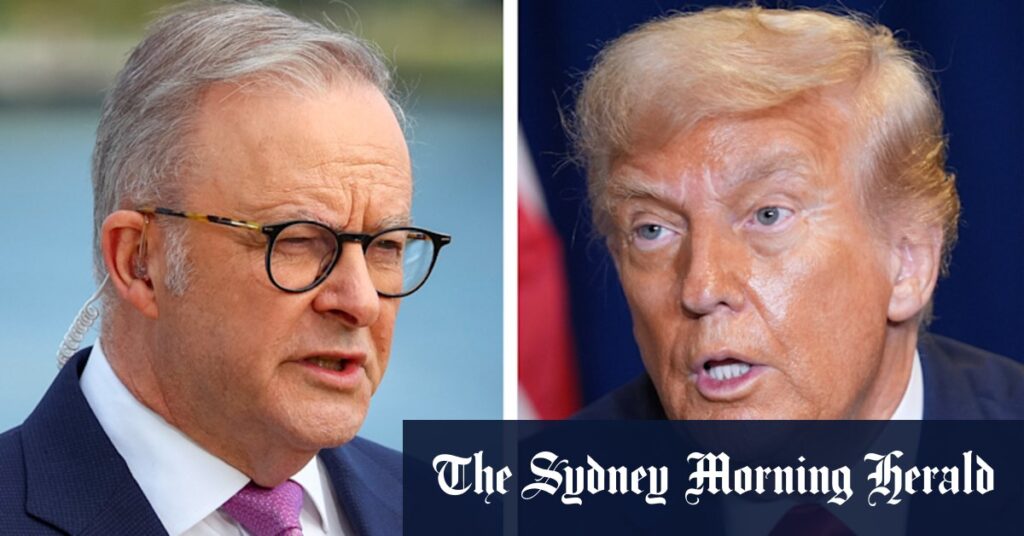
Australia is set to confront the Trump administration’s threat to penalize nations supporting an international agreement to impose a carbon price on global shipping. This move is poised to create further tension with the United States, mere days before Prime Minister Anthony Albanese is scheduled to meet with former President Donald Trump.
In the wake of the US’s declaration last week rejecting what it dubs a global carbon tax, Australian ministers have been engaged in a series of strategic meetings. The US has warned of potential sanctions, visa restrictions, and port levies on allies endorsing the initiative. However, sources indicate that Australia is likely to proceed with its support for the proposal, which will be voted on at the International Maritime Organisation (IMO) meeting in London.
Australia’s Delicate Balancing Act
The Australian government has refrained from publicly declaring its stance, underscoring the complex balancing act it faces. The Labor government is committed to ambitious climate targets, while the Trump administration remains dismissive of green energy initiatives. The proposal is expected to garner backing from key Paris Agreement members, including the European Union, Japan, China, and Pacific nations.
The timing is particularly sensitive for Prime Minister Albanese, who aims to negotiate a reprieve from US tariffs on Australian exports like steel and aluminum during his upcoming meeting with Trump on October 20.
The Shipping Emissions Framework
Known as the shipping’s net zero framework, the proposed scheme is a cap-and-trade system. It imposes financial penalties on companies whose ships exceed emissions limits and rewards those that achieve reductions below the target, allowing them to sell credits. Although international shipping emissions are not counted against any nation’s carbon budget, they account for approximately 3% of global emissions.
US officials are reportedly working to amend the framework, requiring domestic ratification by major shipping nations, effectively granting them veto power. Australia, however, is not expected to support this amendment.
US Opposition and Global Implications
Australia initially signaled its support for the scheme by endorsing a draft at the IMO in April. Since then, the US has intensified its opposition, arguing that the framework could increase shipping costs by about 10% and raise prices for consumers of imported goods.
US Secretary of State Marco Rubio stated, “The US will move to hit Western nations that sponsor this European-led neocolonial export of global climate regulations.”
Australian officials have been deliberating their response to the US’s opposition, leading to speculation within industry circles that Australia might abstain from voting to appease Trump.
Domestic and International Repercussions
Abandoning support for the international shipping carbon tax could not only alienate Australia’s allies but also expose the government to criticism over its commitment to revitalizing local manufacturing with clean technology. The government’s $23 billion Future Made in Australia fund aims to support the transition to a net zero economy by investing in clean industries like green steel and aluminum.
Opposition transport spokesperson Bridget McKenzie criticized the carbon tax, stating, “Labor should have vigorously opposed this tax. Instead, it’s another example of Labor signing us up in secret to an international agreement without explaining the costs to the Australian people.”
Looking Ahead: Climate Credentials and Global Leadership
Australia is actively working to bolster its climate credentials as it competes with Turkey to host next year’s United Nations annual climate summit, COP26. Climate Change Minister Chris Bowen is reportedly considering a shared hosting arrangement with Turkey after President Recep Tayyip Erdoğan refused to withdraw his nation’s bid.
Experts like University of Melbourne Professor Michael Brear emphasize the significance of the IMO vote. “The Albanese government unequivocally should support the vote [at the IMO],” Brear said, noting that it would be a major step towards net zero for international shipping and could drive investment in green fuels to decarbonize other heavy industries.
As Australia navigates these complex international dynamics, the outcome of the IMO vote and subsequent diplomatic engagements will be pivotal in shaping its climate policy and global standing.






